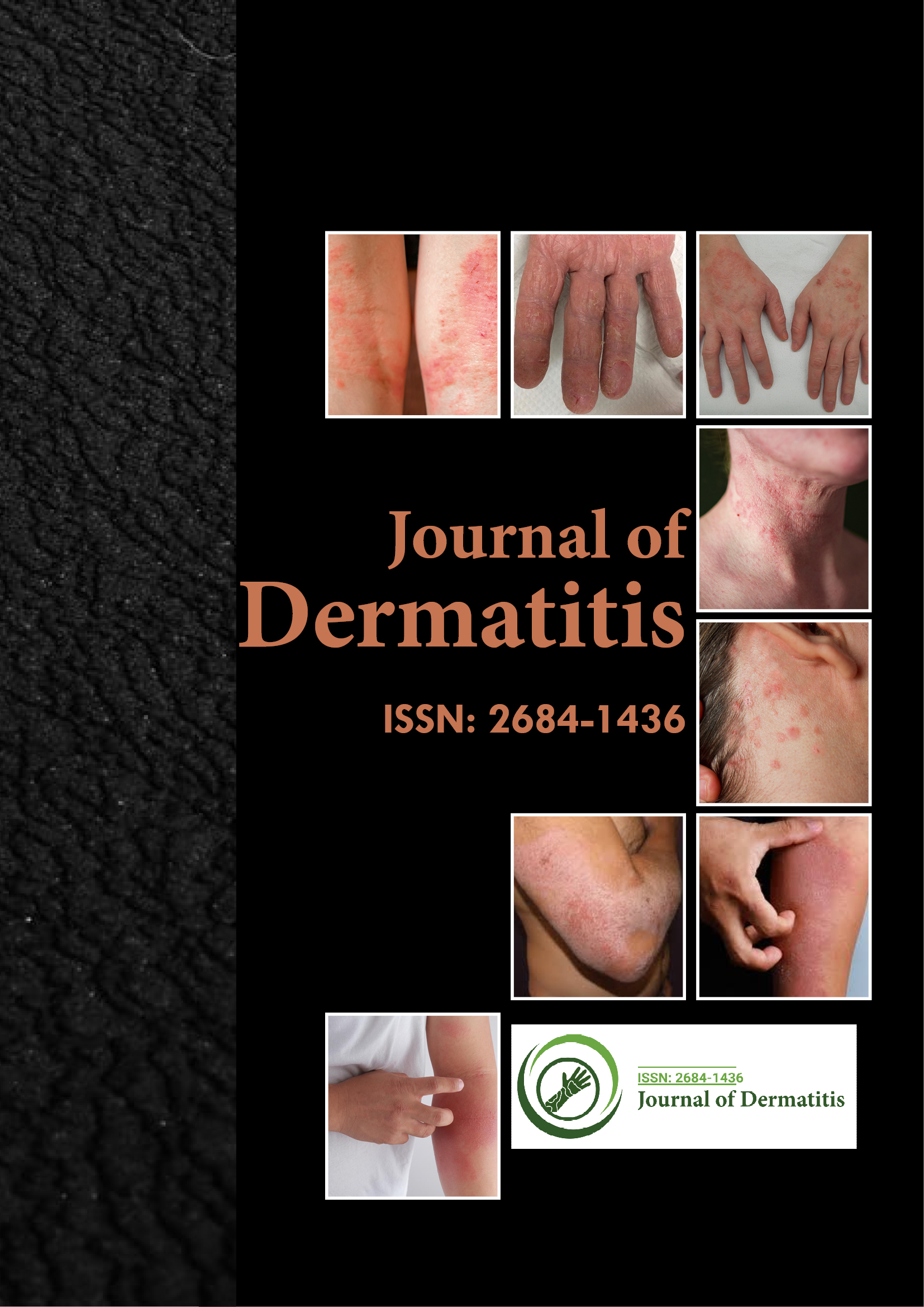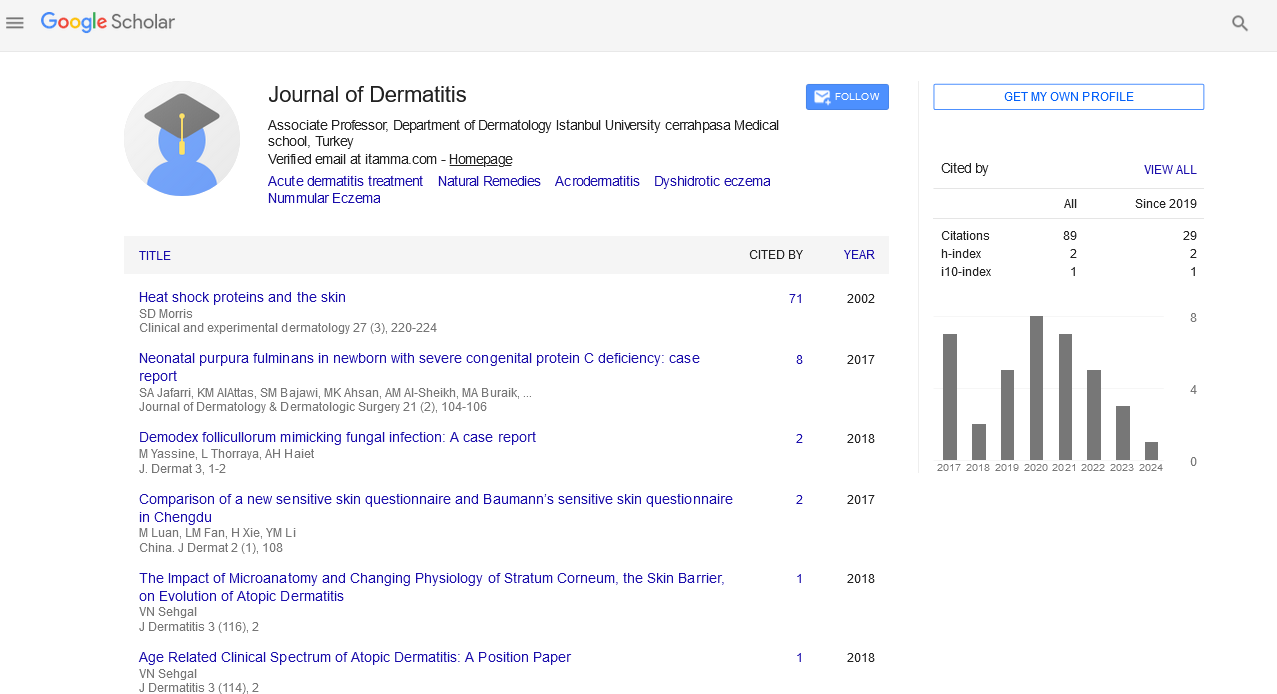Indexed In
- RefSeek
- Hamdard University
- EBSCO A-Z
- Euro Pub
- Google Scholar
Useful Links
Share This Page
Journal Flyer

Open Access Journals
- Agri and Aquaculture
- Biochemistry
- Bioinformatics & Systems Biology
- Business & Management
- Chemistry
- Clinical Sciences
- Engineering
- Food & Nutrition
- General Science
- Genetics & Molecular Biology
- Immunology & Microbiology
- Medical Sciences
- Neuroscience & Psychology
- Nursing & Health Care
- Pharmaceutical Sciences
Commentary - (2025) Volume 10, Issue 2
An Overview on Impact of Lifestyle Factors on Dermatitis Severity
Kelsey Simpson*Received: 19-Jan-2024, Manuscript No. JOD-24-24659; Editor assigned: 23-Jan-2024, Pre QC No. JOD-24-24659 (PQ); Reviewed: 06-Feb-2024, QC No. JOD-24-24659; Revised: 06-Jan-2025, Manuscript No. JOD-24-24659 (R); Published: 13-Jan-2025, DOI: 10.35248/2684-1436.25.10.278
Abstract
Description
Dermatitis, a diverse range of inflammatory skin conditions, is influenced by various factors, including genetic predisposition, environmental triggers, and immune system responses. In recent years, there has been an increased acknowledgment of the impact of lifestyle factors on the severity of dermatitis. Lifestyle encompasses a broad spectrum of behaviours and choices, from dietary habits and stress management to sleep patterns and physical activity. Understanding how lifestyle factors interplay with dermatitis can offer valuable insights into the management and prevention of flare-ups, contributing to a more holistic approach to skin health.
Diet plays a significant role in overall health, and recent evidence suggests that certain dietary factors may influence the severity of dermatitis. The relationship between diet and dermatitis is complex and varies among individuals, but research has highlighted several key considerations. Diets rich in antiinflammatory foods, such as fruits, vegetables, fatty fish, and whole grains, may positively impact dermatitis severity. These foods contain antioxidants and omega-three fatty acids, which can help modulate the inflammatory response. Conversely, diets high in processed foods, sugars, and saturated fats may contribute to inflammation and exacerbate dermatitis.
Adequate hydration is important for maintaining skin health, as dehydration can lead to dry and irritated skin, potentially worsening dermatitis symptoms. Ensuring an adequate intake of water and incorporating hydrating foods, such as fruits and vegetables, can contribute to skin hydration. Stress is a wellrecognized trigger for dermatitis flare-ups, and its impact on the immune system can exacerbate inflammatory skin conditions. Chronic stress can lead to the release of stress hormones, such as cortisol, which may contribute to increased inflammation in the skin. Additionally, stress can disrupt skin barrier function, making the skin more susceptible to irritants and allergens.
Incorporating mind-body practices, such as meditation, yoga, and deep breathing exercises, can help manage stress levels and potentially improve dermatitis outcomes. These practices have been shown to modulate the body's stress response and may positively impact immune function. Seeking counseling or support for stress management can be beneficial for individuals with dermatitis. Addressing underlying stressors, developing coping strategies, and fostering emotional well-being are integral aspects of a holistic approach to dermatitis care.
Sleep is essential for overall health, and disruptions in sleep patterns can influence dermatitis severity. Poor sleep quality and inadequate sleep duration may contribute to increased inflammation and impaired skin barrier function. Establishing good sleep hygiene practices can be particularly relevant for individuals with dermatitis. Regular physical activity is associated with numerous health benefits, including improved circulation, immune function, and stress management. While the impact of exercise on dermatitis severity is not fully elucidated, some considerations may be relevant.
Intense physical activity leading to excessive sweating can potentially exacerbate dermatitis, especially in individuals prone to irritation. Showering promptly after exercise and choosing moisture-wicking clothing may help mitigate this risk. Exposure to environmental factors during outdoor activities can influence dermatitis severity. For example, prolonged sun exposure may worsen symptoms for some individuals, emphasizing the importance of sun protection measures.
Environmental factors, both indoor and outdoor, can significantly impact dermatitis severity. Allergens, irritants, and climate conditions are among the considerations. Identifying and minimizing exposure to common allergens and irritants can be significant in managing dermatitis. These may include certain fabrics, fragrances, household cleaning products, and airborne allergens like pollen or dust mites.
Climate conditions, particularly extremes of temperature and humidity, can influence dermatitis. Cold, dry weather may contribute to skin dryness, while hot and humid conditions can lead to sweating and potential irritation. Adjusting skincare routines and using appropriate clothing in response to climate changes is important. The products used for personal care and skincare can impact dermatitis severity. Harsh cleansers, fragranced products, and certain cosmetic ingredients may contribute to skin irritation.
Opting for gentle, fragrance-free skincare products can help maintain skin barrier function and reduce the risk of irritation. Choosing products specifically formulated for sensitive or dermatitis-prone skin can be beneficial. Bathing practices, including water temperature and duration, can influence dermatitis. Long, hot showers may contribute to skin dryness, while short, lukewarm baths may be preferable. Applying moisturizers promptly after bathing can help trap moisture in the skin. Tobacco smoking and excessive alcohol consumption have been associated with adverse effects on skin health. Smoking can contribute to premature aging of the skin and impair wound healing, while excessive alcohol intake may lead to dehydration and skin dryness.
Quitting smoking is not only beneficial for overall health but can also contribute to improved skin health. Smoking cessation has been linked to a reduction in skin aging and may positively impact dermatitis severity. Moderation in alcohol consumption, along with adequate hydration, can help maintain skin health. Excessive alcohol intake can contribute to dehydration and potentially worsen dermatitis symptoms.
Conclusion
The impact of lifestyle factors on dermatitis severity underscores the interconnectedness of skin health with overall well-being. While a complex process of genetic, environmental, and immune factors influences dermatitis, lifestyle choices can play a pivotal role in managing and preventing flare-ups. A holistic approach to dermatitis care involves considering dietary patterns, stress management, physical activity, environmental exposures, skincare practices, and other lifestyle factors. Individualized care plans that address the unique needs and triggers of each person can contribute to more effective and sustainable outcomes.Citation: Simpson K (2025) An Overview on Impact of Lifestyle Factors on Dermatitis Severity. J Dermatitis. 10:278.
Copyright: © 2025 Simpson K. This is an open access article distributed under the terms of the Creative Commons Attribution License, which permits unrestricted use, distribution, and reproduction in any medium, provided the original author and source are credited.

